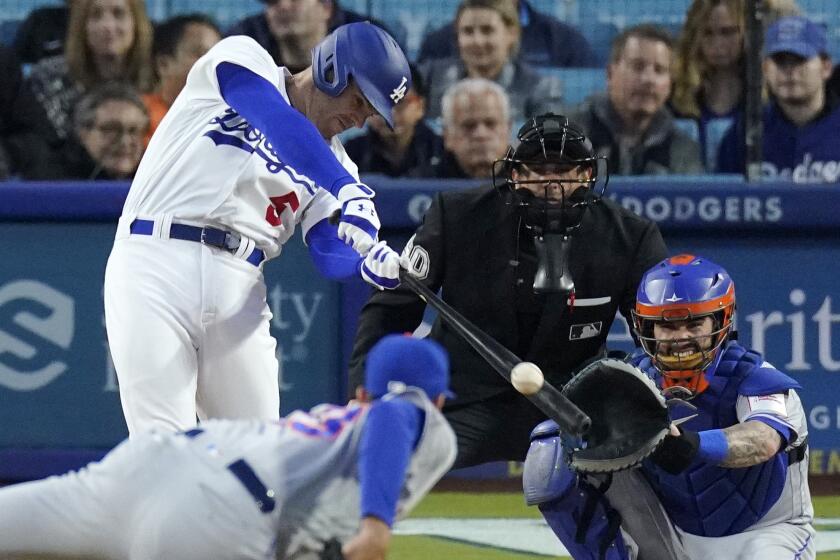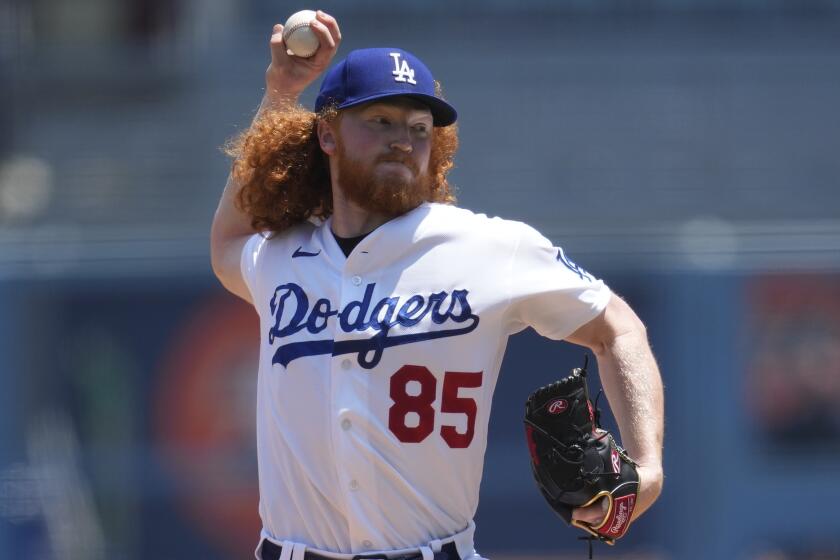
The swing was honed on the sandlots of suburban Orange County, the product of years of daily batting practice between a son and his dad.
On almost every afternoon of his Southern California childhood, Freddie Freeman would get picked up from school by his father, Fred, bring a bucket of exactly 48 baseballs to a field near their house, then take an hour of hacks off balls Fred flipped to him.
It’s the way Freeman’s swing was first crafted as a young player — a routine that, decades later on Friday night, served as the genesis of unforgettable October history.
With the bases loaded in the bottom of the 10th inning, and the Dodgers one out away from defeat to the New York Yankees in Game 1 of the World Series, Freeman etched his name into postseason lore, giving an instant autumn classic a raucous, storybook ending.
On the first walk-off grand slam in a World Series game, Freeman lifted the Dodgers to a 6-3 win.

Freddie Freeman’s walk-off grand slam for the Dodgers in Game 1 of the World Series against the Yankees.
And after being mobbed by his teammates and serenaded by more than 50,000 fans, Freeman immediately went to find his dad in the crowd.
“My swing is because of him. My approach is because of him. I am who I am because of him,” Freeman said of Fred, whom he greeted with a two-handed high five in an exchange behind the home plate netting.
The Dodgers and New York Yankees will play Major League Baseball’s starriest World Series in decades.
“You couldn’t script it any better,” Fred added, still standing in his field-level seats as pandemonium ensued around him. “For his year, the way it happened, it’s unbelievable … It’s just amazing.”
Indeed, this was not poised to be Freeman’s October. Not after a season of off-field adversity, including 3-year-old son Max’s battle with a frightening case of Guillain-Barré syndrome in August, briefly leaving the boy paralyzed. And not long after, Freeman sprained his ankle during the last week of the regular season.

While the veteran first baseman has been able to play through the injury for most of the playoffs, it has required hours of pregame treatment — and, as a result, precious little time in the batting cage to refine his hampered swing.
“He’s doing something that is basically heroic, to put himself in a position to even be available, much less in the starting lineup,” teammate Kiké Hernández said. “Freddie is a grinder. Not too many superstars grind the way Freddie does.”
In recent days, however, Freeman finally experienced some smoother sailing. The week off leading up to the World Series allowed his ankle to significantly improve, with Freeman recording his lowest level of swelling since getting hurt. Meanwhile, the slugger found a new mental cue that synced up his swing mechanics, telling himself to “step out” with his injured lead foot on each hack in order to keep pressure off the most sensitive part of his injury.

“He told me yesterday, ‘Dad, I think I’m gonna hit well,’” Fred recalled.
“And,” Fred added with a laugh of disbelief, “he did.”
Freeman was one of the few to hit Yankees starter Gerrit Cole, with his first-inning triple serving as the Dodgers’ only knock until the fifth inning. That’s when Hernández found the right-field corner with a line drive that got past an overly aggressive route from outfielder Juan Soto. Hernández scored soon after, sliding home head-first on a Will Smith sacrifice fly.
While that run opened the scoring, the lead quickly changed hands. In the sixth, Giancarlo Stanton hammered a low slider from Dodgers starter Jack Flaherty, blasting a two-run home run around the left-field foul pole.
The Dodgers leveled the score in the eighth inning, with the help of more sloppy Yankees defense. With one out, Shohei Ohtani roped a double off the wall in right, then took third when the cut-off throw got away from second baseman Gleyber Torres. Ohtani then scored on a Mookie Betts sacrifice fly.
Freddie Freeman’s walk-off grand slam in Game 1 of the World Series against the Yankees sounded and felt just like Kirk Gibson’s iconic World Series home run.
The score remained 2-2 until the 10th inning, when Jazz Chisholm Jr. lined a one-out single off Dodgers reliever Blake Treinen, stole second and third base off Treinen’s slow stretch delivery, then scored on a ground ball from Anthony Volpe.
That left it up to the Dodgers to answer. With two on and two outs in the 10th, the Yankees decided to intentionally walk Betts with first base open, preferring to have Nestor Cortes — a left-hander making his first appearance of the postseason after missing the first two rounds because of an injury — face Freeman in a left-on-left matchup.
“I was almost hoping Mookie would get the hit,” Fred joked, having been wracked with nerves as Freeman came to the plate.
Instead, Freeman anticipated a first-pitch fastball. He got the barrel out in front of an inner-half offering. Then, he raised his bat in the air as the ball disappeared into the right-field pavilion; not far from where Kirk Gibson, playing through his own leg injury 36 years earlier, landed his iconic Game 1 walk-off blast in the 1988 World Series.
“Everything was the same,” manager Dave Roberts remarked. “Outside of the fist pumps.”

Freeman’s celebration wasn’t much more understated. He met first base coach Clayton McCullough with a low-five. He flexed his arms as he rounded second. And by the time he reached the home stretch — feeling as though he was “just kind of floating” around the bases — his teammates were waiting with open arms and crazed excitement, swallowing him in a dog pile at the plate.
“Knowing what Freddie has gone through, it’s super special,” Betts said. “I’m glad it was Freddie who did it.”
When Freeman broke away from his teammates, he immediately ran over to his father behind the plate. Through the netting, they high-fived and clasped hands. Then they wildly screamed while nearly touching faces. No words were necessary.
“I just wanted to share that with him, because he’s been there,” said Freeman, whose batting practice routine with his father only took shape after his mom, Rosemary, died of cancer when he was 10.
“He’s been through a lot in his life too,” Freeman added. “And just to have a moment like that, I just wanted to be a part of that with him.”
While Freeman said he would picture hitting World Series home runs in games of backyard Wiffle Ball with his two older brothers, such imagination rarely accompanied his daily BP with Fred. Those sessions were for serious work, for focused repetitions, for the kind of consistency upon which Freeman has built his 15-year career.
Freddie Freeman is a career .300 hitter and could be on his way to the Hall of Fame thanks to techniques he and father first honed when he was young.
“We never did that,” Fred said. “It was always hit the next line drive. Hit the next line drive. We never visualized something like that. It was always going through what we’re supposed to do.”
That’s why, when Freeman stepped into the box in the 10th inning, he wasn’t thinking about hitting a grand slam. He wasn’t trying to end the game with a historic, legacy-cementing blast. Instead, he crouched into his batting position, cocked his bat behind his head and took the same swing he and his dad honed in his youth, and continue to refine to this day.
“All the batting practice, all the relentless hours we spent together on a baseball field, we still do it in the offseasons together,” Freeman said. “If he didn’t throw me batting practice, if he didn’t love the game of baseball, I wouldn’t be here playing this game. So that’s Fred Freeman’s moment right there.”
One destined to live forever — after decades in the making.
Looking back at the Dodgers’ path through the postseason before their victory over the New York Yankees in the 2024 World Series.
More to Read
Are you a true-blue fan?
Get our Dodgers Dugout newsletter for insights, news and much more.
You may occasionally receive promotional content from the Los Angeles Times.










